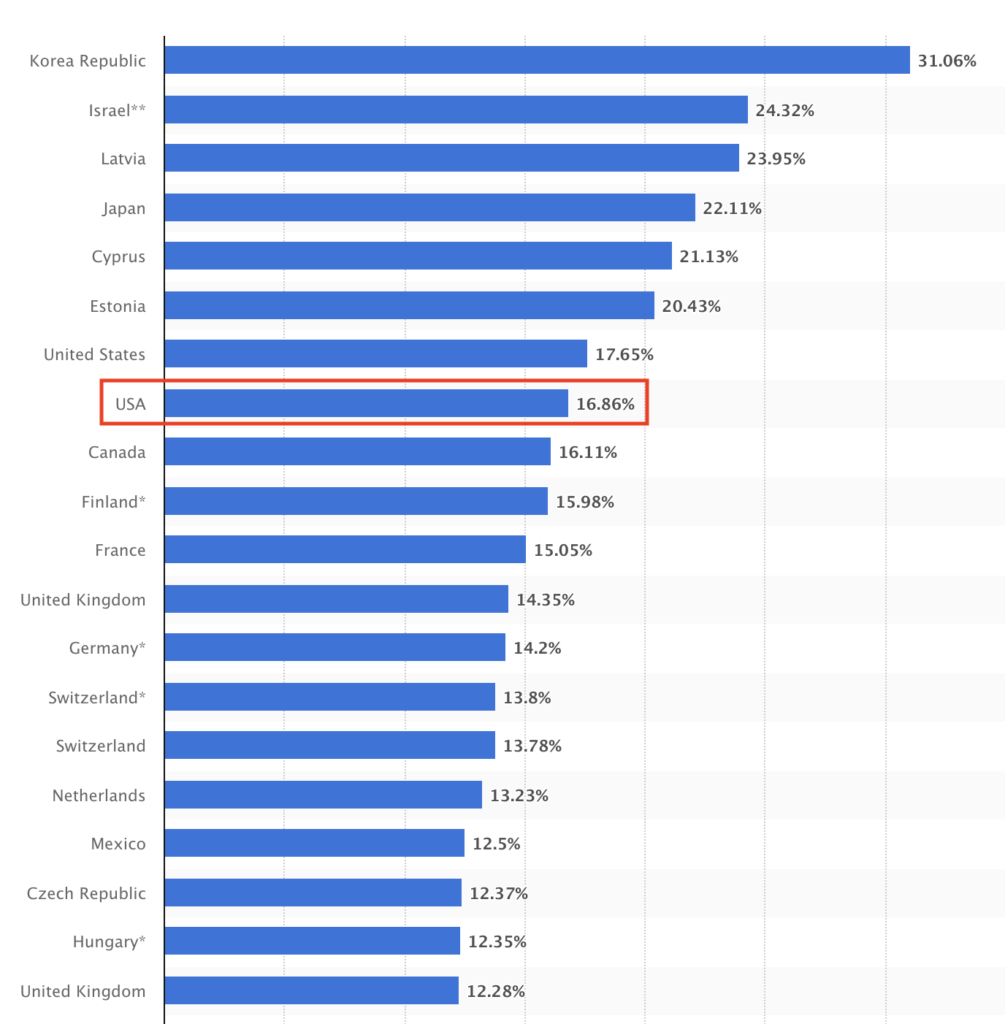Image: Canva
The Significance of Equal Pay Day
Every year, Equal Pay Day serves as a poignant reminder of the persistent gender wage gap that continues to plague societies around the world. This day, marked on different dates depending on the country, symbolizes how far into the year women must work to earn what men earned in the previous year. It’s a stark reflection of the ongoing disparities in pay based on gender, despite decades of progress in the fight for equality.
A Persistent Challenge in the United States
In the United States, Equal Pay Day typically falls in April, highlighting the substantial pay gap between men and women. According to the latest statistic from Statista in 2024, women in the United States still earn just 83 cents for every dollar earned by men, with the gap being even wider for women of color. This wage gap persists across industries and occupations, affecting women at every stage of their careers.
Impact on Women and Society
The implications of the gender wage gap are far-reaching, extending beyond individual economic well-being to impact families, communities, and society as a whole. Women’s lower earnings can lead to diminished financial security, reduced retirement savings, and limited opportunities for career advancement. Moreover, the wage disparity contributes to broader issues of income inequality and perpetuates systemic barriers that hinder women’s full participation and economic empowerment.
Policies and Practices to Address Wage Disparities
Addressing the gender wage gap requires a multifaceted approach that involves policymakers, employers, and individuals alike. Legislative measures such as the Equal Pay Act of 1963 in the U.S. have been instrumental in combating wage discrimination, yet more needs to be done to close the gap completely. Strengthening enforcement mechanisms, promoting pay transparency, and implementing policies to address occupational segregation are essential steps toward achieving wage parity.
Fostering Pay Equity in Organizations
Employers also play a crucial role in fostering pay equity within their organizations. Initiatives such as conducting regular pay audits, eliminating salary history inquiries, and implementing structured compensation policies based on job-related factors can help mitigate unconscious bias and ensure fair and equitable pay practices. Additionally, promoting diversity and inclusion in leadership positions and fostering a culture of accountability are integral to creating workplaces where all employees are valued and compensated fairly.
Advocating for Equal Pay and Workplace Fairness
Individuals can also take action to advocate for equal pay and workplace fairness. Negotiating salary openly and confidently, seeking out employers with transparent pay practices, and supporting organizations and initiatives that promote gender equality are meaningful ways to contribute to the advancement of pay equity. Moreover, raising awareness about the gender wage gap and advocating for policy reforms can help drive systemic change and create a more equitable future for all.
A Call for Action Towards Wage Equality and Workplace Fairness
As we observe Equal Pay Day, let us recommit ourselves to the pursuit of wage equality and workplace fairness. Closing the gender wage gap is not only a matter of economic justice but also a fundamental human right. By working together to dismantle barriers, challenge outdated norms, and champion inclusivity, we can build a more just and equitable society where every individual has the opportunity to thrive, regardless of gender.






 English
English Deutsch
Deutsch Українська
Українська Polski
Polski עִבְרִית
עִבְרִית Türkçe
Türkçe العربية
العربية Français
Français Italiano
Italiano Español
Español 繁體中文
繁體中文 简体中文
简体中文 Shqip
Shqip Bosanski
Bosanski Български
Български Hrvatski
Hrvatski Čeština
Čeština Nederlands
Nederlands Suomi
Suomi Српски језик
Српски језик Ελληνικά
Ελληνικά Русский
Русский Română
Română Português
Português فارسی
فارسی ਪੰਜਾਬੀ
ਪੰਜਾਬੀ Svenska
Svenska Afrikaans
Afrikaans አማርኛ
አማርኛ Հայերեն
Հայերեն Azərbaycan dili
Azərbaycan dili Euskara
Euskara Беларуская мова
Беларуская мова বাংলা
বাংলা Català
Català Cebuano
Cebuano Chichewa
Chichewa Corsu
Corsu Dansk
Dansk Esperanto
Esperanto Eesti
Eesti Filipino
Filipino Frysk
Frysk Galego
Galego ქართული
ქართული ગુજરાતી
ગુજરાતી Kreyol ayisyen
Kreyol ayisyen Harshen Hausa
Harshen Hausa Ōlelo Hawaiʻi
Ōlelo Hawaiʻi हिन्दी
हिन्दी Hmong
Hmong Magyar
Magyar Íslenska
Íslenska Igbo
Igbo Bahasa Indonesia
Bahasa Indonesia Gaeilge
Gaeilge 日本語
日本語 Basa Jawa
Basa Jawa ಕನ್ನಡ
ಕನ್ನಡ Қазақ тілі
Қазақ тілі ភាសាខ្មែរ
ភាសាខ្មែរ 한국어
한국어 كوردی
كوردی Кыргызча
Кыргызча ພາສາລາວ
ພາສາລາວ Latin
Latin Latviešu valoda
Latviešu valoda Lietuvių kalba
Lietuvių kalba Lëtzebuergesch
Lëtzebuergesch Македонски јазик
Македонски јазик Malagasy
Malagasy Bahasa Melayu
Bahasa Melayu മലയാളം
മലയാളം Maltese
Maltese Te Reo Māori
Te Reo Māori मराठी
मराठी Монгол
Монгол ဗမာစာ
ဗမာစာ नेपाली
नेपाली Norsk bokmål
Norsk bokmål پښتو
پښتو Samoan
Samoan Gàidhlig
Gàidhlig Sesotho
Sesotho Shona
Shona سنڌي
سنڌي සිංහල
සිංහල Slovenčina
Slovenčina Slovenščina
Slovenščina Afsoomaali
Afsoomaali Basa Sunda
Basa Sunda Kiswahili
Kiswahili Тоҷикӣ
Тоҷикӣ தமிழ்
தமிழ் తెలుగు
తెలుగు ไทย
ไทย اردو
اردو O‘zbekcha
O‘zbekcha Tiếng Việt
Tiếng Việt Cymraeg
Cymraeg isiXhosa
isiXhosa יידיש
יידיש Yorùbá
Yorùbá Zulu
Zulu